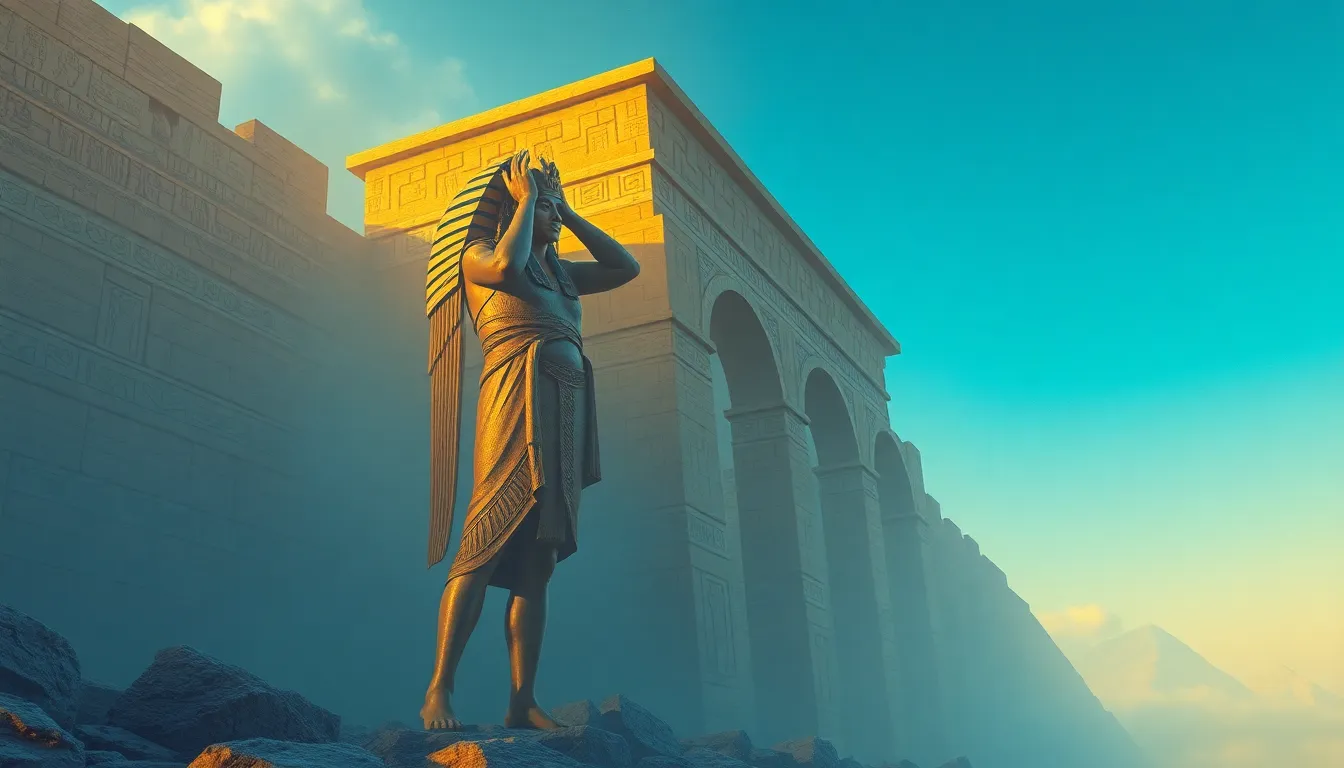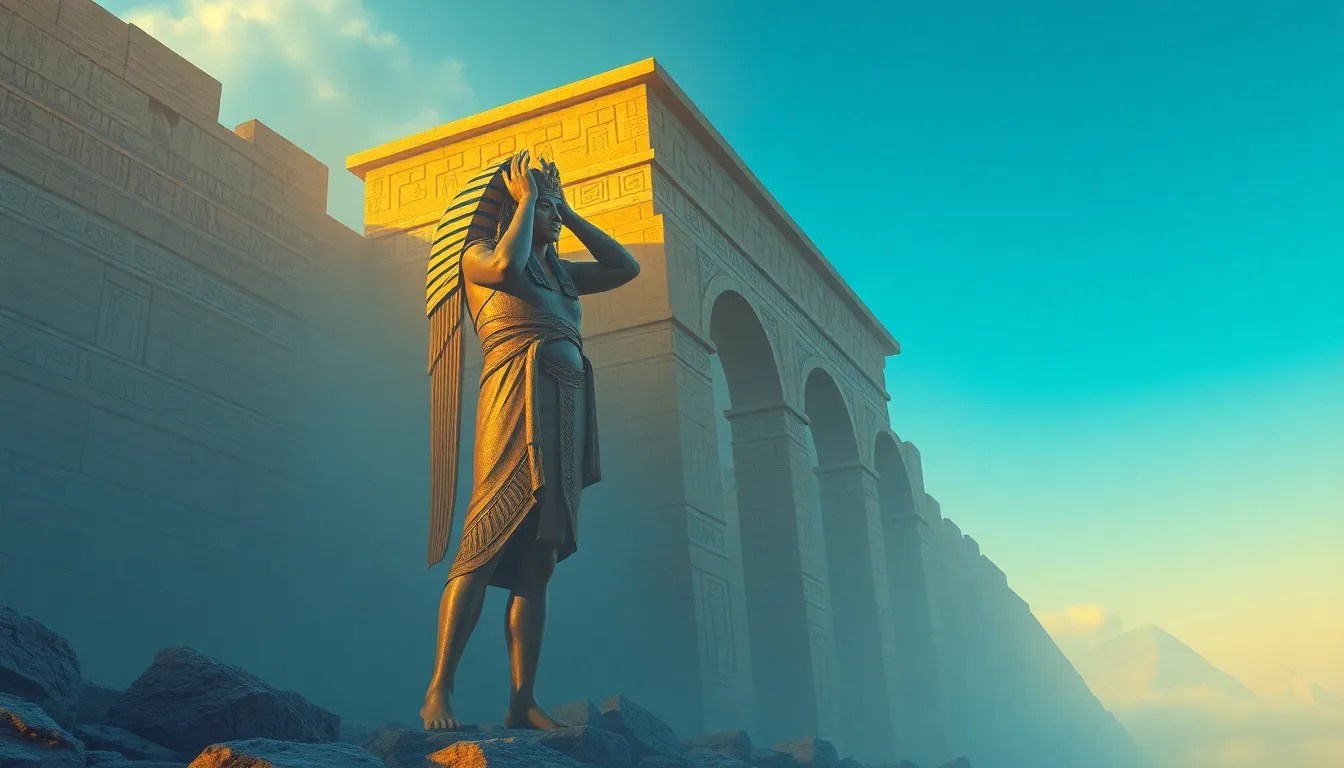Exploring the Myths of Creation: How Ancient Egyptians Explained the Universe
I. Introduction
The ancient Egyptian civilization, one of the most remarkable societies in history, flourished along the banks of the Nile River for thousands of years. Known for its monumental architecture, intricate art, and profound spiritual beliefs, Egypt’s rich culture continues to captivate the imagination of people around the world. A central aspect of this civilization was its mythology, which provided a framework for understanding the cosmos and the human experience.
Mythology played a crucial role in ancient Egyptian society, offering explanations for natural phenomena, the origins of the universe, and the place of humans within it. Through their creation myths, the Egyptians articulated their beliefs about the divine and the nature of existence. This article aims to explore these creation myths, examining their significance and the insights they provide into the ancient Egyptian worldview.
II. The Role of Deities in Creation
In ancient Egyptian mythology, creation was often attributed to the actions of powerful deities. Numerous gods were involved in the creation process, each embodying different aspects of existence and the cosmos.
A. Key Deities Involved in the Creation Process
- Atum: Considered the first god and creator, Atum self-generated from the chaotic waters of Nun and brought forth the other gods.
- Ra: The sun god, Ra was a vital force in creation, embodying light and life. He was often associated with the daily cycle of creation and rebirth.
- Ptah: A creator god associated with craftsmanship and creation through thought and speech, Ptah was particularly revered in Memphis.
B. The Significance of Gods in Egyptian Cosmology
The pantheon of Egyptian gods was complex, with deities representing various elements of life and nature. These gods were not merely figures of worship; they were integral to the Egyptians’ understanding of the world and the forces that shaped it. Each god had specific roles and attributes that contributed to the overall narrative of creation and existence.
III. The Creation Myths: A Comparative Overview
Ancient Egypt was home to several creation myths, each originating from different cities and eras, reflecting local beliefs and practices.
A. Overview of Different Creation Myths in Ancient Egypt
- Heliopolitan Creation Myth: Originating from Heliopolis, this myth describes how Atum emerged from the primordial waters of Nun and created the first gods through his own body.
- Memphis Creation Myth: In this version, Ptah is the principal creator who conceived the world through his heart and brought it into being through his speech.
- Theban Creation Myth: Centered around the god Amun, this myth portrays him as a hidden force who emerges to create the world, often associated with the concept of hiddenness and mystery.
B. Similarities and Differences Among These Narratives
Despite their differences, these myths share common themes, such as the emergence of order from chaos and the importance of divine intervention. They reflect the Egyptians’ understanding of creation as a dynamic process influenced by various deities, each with unique attributes and powers.
IV. The Concept of Chaos and Order (Ma’at)
Central to Egyptian mythology is the duality of chaos and order, represented by Nun and Ma’at, respectively.
A. The Role of Chaos (Nun) in the Creation Narrative
Nun symbolizes the chaotic waters that existed before creation. It represents the formlessness and potential of the universe, from which order emerged through the actions of the gods.
B. The Establishment of Order (Ma’at) and Its Implications for the Universe
Ma’at embodies truth, balance, and cosmic order. The establishment of Ma’at was essential for maintaining harmony in the universe, influencing everything from the daily cycle of the sun to the moral conduct of individuals.
C. The Balance of Chaos and Order in Egyptian Thought
The interplay between chaos and order was fundamental to Egyptian philosophy, reminding individuals of the need to uphold Ma’at in their lives to ensure cosmic stability.
V. Creation as a Cyclical Process
In ancient Egyptian belief, creation was not a one-time event but a cyclical process, deeply intertwined with the concepts of time and renewal.
A. Understanding Time and the Cyclical Nature of Creation
Egyptians viewed time as cyclical, marked by the daily journey of the sun across the sky and the annual flooding of the Nile, both seen as acts of creation and renewal.
B. The Significance of Renewal and Rebirth in Egyptian Mythology
Renewal and rebirth were celebrated in various myths and rituals, emphasizing the idea that life constantly emerged from death, reflecting the eternal cycles of nature.
C. Festivals and Rituals that Celebrate Creation and Regeneration
- The Opet Festival: Celebrating the flooding of the Nile and the rejuvenation of the land.
- The Wepet-Renenutet Festival: Marking the start of the agricultural year and the cycle of growth.
VI. The Impact of Creation Myths on Egyptian Culture
The creation myths of ancient Egypt significantly influenced various aspects of culture, shaping art, architecture, and daily life.
A. Influence on Art, Architecture, and Literature
Many temples and monuments were constructed to honor the gods of creation, featuring intricate carvings and inscriptions that depicted creation myths, reflecting the Egyptians’ reverence for their deities.
B. Reflections of Creation Myths in Daily Life and Governance
The principles of Ma’at guided governance, with pharaohs seen as divine rulers responsible for maintaining cosmic order and ensuring prosperity for their people.
C. The Legacy of These Myths in Later Egyptian History
As the civilization evolved, these creation myths continued to influence subsequent generations, shaping religious practices and cultural identity throughout Egyptian history.
VII. Modern Interpretations and Relevance
Contemporary scholars continue to explore the significance of ancient Egyptian creation myths, offering new insights into their meanings and implications.
A. How Contemporary Scholars View Ancient Egyptian Creation Myths
Scholars analyze these myths not only as religious texts but also as reflections of social and political dynamics within ancient Egyptian society.
B. The Relevance of These Myths in Modern Spiritual and Cultural Contexts
Many aspects of these myths resonate with modern spiritual beliefs, emphasizing themes of creation, renewal, and the interconnectedness of life.
C. Comparing Ancient Beliefs with Modern Scientific Explanations of the Universe
While ancient Egyptians explained the universe through the lens of mythology, contemporary science seeks to understand it through empirical evidence, yet both perspectives provide valuable insights into the nature of existence.
VIII. Conclusion
In summary, the creation myths of ancient Egypt offer profound insights into the civilization’s understanding of the universe and the divine. These narratives highlight the significance of chaos and order, the cyclical nature of existence, and the enduring impact of mythology on culture and society.
The fascination with ancient Egyptian creation myths endures, inviting us to reflect on our own beliefs and the age-old questions of existence. By studying these myths, we gain a deeper understanding of the human experience and our place within the cosmos.




